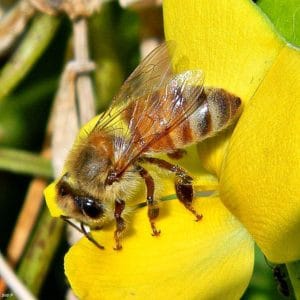Results 1 to 3 of 3
Thread: Bees Dying by the Millions
Thread Information
Users Browsing this Thread
There are currently 1 users browsing this thread. (0 members and 1 guests)
-
07-13-2013, 10:57 AM #1Banned

- Join Date
- Jun 2013
- Posts
- 8,546
Bees Dying by the Millions
Bees Dying by the Millions
July 8th, 2013ThePost (Hanover, Ontario)
By Jon Radojkovic
ELMWOOD - Local beekeepers are finding millions of their bees dead just after corn was planted here in the last few weeks. Dave Schuit, who has a honey operation in Elmwood, lost 600 hives, a total of 37 million bees.
 Image source:
Image source:
Bob Peterson, Wikimedia
“Once the corn started to get planted our bees died by the millions,” Schuit said. He and many others, including the European Union, are pointing the finger at a class of insecticides known as neonicotinoids, manufactured by Bayer CropScience Inc. used in planting corn and some other crops. The European Union just recently voted to ban these insecticides for two years, beginning December 1, 2013, to be able to study how it relates to the large bee kill they are experiencing there also.
Local grower Nathan Carey from the Neustadt, and National Farmers Union Local 344 member, says he noticed this spring the lack of bees and bumblebees on his farm. He believes that there is a strong connection between the insecticide use and the death of pollinators.
“I feel like we all have something at stake with this issue,” he said. He is organizing a public workshop and panel discussion about this problem at his farm June 22 at 10 a.m. He hopes that all interested parties can get together and talk about the reason bees, the prime pollinators of so any different plant species, are dying.
At the farm of Gary Kenny, south west of Hanover, eight of the 10 hives he kept for a beekeeper out of Kincardine, died this spring just after corn was planted in neighbouring fields.
What seems to be deadly to bees is that the neonicotinoid pesticides are coating corn seed and with the use of new air seeders, are blowing the pesticide dust into the air when planted. The death of millions of pollinators was looked at by American Purdue University. They found that, “Bees exhibited neurotoxic symptoms, analysis of dead bees revealed traces of thiamethoxam/clothianidin in each case. Seed treatments of field crops (primarily corn) are the only major source of these compounds.
Local investigations near Guelph, led to the same conclusion. A Pest Management Regulatory Agency investigation confirmed that corn seeds treated with clothianidin or thiamethoxam “contributed to the majority of the bee mortalities” last spring.
“The air seeders are the problem,” said Ontario Federation of Agriculture director Paul Wettlaufer, who farms near Neustadt. This was after this reporter called John Gillespie, OFA Bruce County president, who told me to call Wettlaufer. Unfortunately, Wettlaufer said it was, “not a local OFA issue,” and that it was an issue for the Grain Farmers of Ontario and representative, Hennry Vanakum should be notified. Vanakum could not be rached for comment.
Yet Guelph University entomologist Peter Kevan, disagreed with the EU ban.
“There’s very little evidence to say that neonicotinoids, in a very general sense, in a broad scale sense, have been a major component in the demise of honeybees or any other pollinators, anywhere in the world,” said Kevan.
But research is showing that honeybee disorders and high colony losses have become a global phenomena. An international team of scientists led by Holland’s Utrecht University concluded that, ”Large scale prophylaxic use in agriculture, their high persistence in soil and water, and their uptake by plants and translocation to flowers, neonicotinoids put pollinator services at risk.” This research and others rsulted in the Eurpean Union ban.
The United Church is also concerned about the death of so many pollinators and has prepared a “Take Action” paper it’s sending out to all its members. The church is basing its action on local research. The Take Action paper states among other things, “Scientific information gathered suggests that the planting of corn seeds treated with neonicotinoids contributed to the majority of the bee mortalities that occurred in corn growing regions of Ontario and Quebec in Spring 2012.”
Meanwhile Schuit is replacing his queen bees every few months now instead of years, as they are dying so frequently. “OMAFRA tells me to have faith. Well, I think it’s criminal what is happening, and it’s hard to have faith if it doesn’t look like they are going to do anything anyway,” Schuit says.
http://www.cornucopia.org/2013/07/be...-the-millions/
For more information on these chemicals I did a search and found this information plus what I am bringing down below this link:
https://startpage.com/do/metasearch.pl
EU Proposes Ban on Neonicotinoids; Syngenta, Bayer Respond
Restrictions on imidacloprid, thiamethoxam, clothianidin expected by July 1.
February 4, 2013
By Jackie Pucci
-
 The ban includes neonicotinoid seed treatments on oil seed rape fields such as this one in Neubrandenburg, Germany.
The ban includes neonicotinoid seed treatments on oil seed rape fields such as this one in Neubrandenburg, Germany.
Bayer CropScience
The European Union proposed a two-year ban on imidacloprid, thiamethoxam and clothianidin on crops attractive to honey bees, a move prompted by a European Food Safety Authority (EFSA) report that identified risks to the bees.
The Commission also wants to prohibit the sale and use of seeds treated with plant protection products containing these active substances, according to a Jan. 31 proposal at a meeting of the Standing Committee on the Food Chain and Animal Health.
The Commission asked member states to put in place a two-year suspension on clothianidin, imidacloprid and thiamethoxam as granules, seed treatment or sprays on maize, oil seed rape, sunflowers, cotton and cereals (except for winter cereals). The regulation is expected to be implemented by July 1.
“These are proportionate measures. We are giving the member states two years to see whether it’s working. Then we will see if we need to review the legislation in Europe,” the Commission’s spokesperson for health and consumer policy, Frederic Vincent, said on Jan. 31 in an article on the Europolitics website.
In its report published Jan. 16, EFSA found that contamination of neonicotinoid-treated crops, neonicotinoid dust exposure, and nectar and pollen exposure contributes to declines in honey bees and weakens their hives. It also identified high risks from exposure to guttation fluid from corn for thiamethoxam.
Syngenta, Bayer React
Basel, Switzerland-based Syngenta, which makes thiamethoxam, said it believes the EFSA “found itself under political pressure to produce a hurried and inadequate risk assessment, which even they acknowledge contains a high level of uncertainty.” A recent study cited by the company showed that without neonicotinoid seed treatment, crop yields would fall by 40% and cost the EU economy around $23.1 billion over five years.
“Seed treated with thiamethoxam has been used across millions of hectares of European crops for over ten years. When used properly the technology does not damage bee populations and this is why many EU countries have continued to support its use,” Syngenta said.
Bayer CropScience -- the principal manufacturer of imidacloprid -- called the proposal "draconian" and a "missed opportunity to achieve a fair and proportional solution."
Bayer, of Monheim, Germany, requested EU member states "adhere to the principles of proportionality when addressing the Commission’s proposal and refer back to solid science before taking any measures."
The company added: "Any disproportionate action would jeopardize the competitiveness of European agriculture and finally lead to higher costs for food, feed, fiber and renewable raw materials and have an enormous economic impact throughout the whole food chain."
http://www.farmchemicalsinternationa...-bayer-respond
-
07-13-2013, 11:00 AM #2Banned

- Join Date
- Jun 2013
- Posts
- 8,546
Join the CIA! (the Cornucopia Intelligence Agency)
July 10th, 2013Help Us Separate Factory Farm Brands of “Organic” Chicken from the Real McCoy
Cornucopia’s organic brand scorecards are one of the most popular features of our website. Our scorecard ratings (dairy, eggs, soy products, cereal, etc.) help consumers choose the best food for themselves and their families. Now we need your help, as we develop a new scorecard to rate brands of organic chicken.
 Image source:
Image source:
Albertus Verhoesen, Wikimedia
In order to include all possible brands in the chicken scorecard, we need your help to tell us what brands of certified organic chicken are available in your local retail stores, coops, and farmers markets.
We need to know the store name, the city/state where the store is located, the brand name, the certifier, and the distributor’s name (all this should be available on the package).
For example, a Costco store in East Wenatchee, Washington sells the brand Coleman Organic chicken, certified by OTCO, distributed by Coleman Natural Organics.
Please send the information in an email to chicken@cornucopia.org, or call Jason at 608-625-2000.
Cornucopia will carefully check out the labeling claims made by your favorite organic chicken brand. But there’s another reason to participate: your name will be entered into a drawing to receive a very special organic food prize.
Along with the scorecard, we will also publish a report comparing organic chicken husbandry to the factory farmed model. We are currently researching organic chicken farming practices, reviewing the USDA National Organic Program regulations, and visiting organic farms.
http://www.cornucopia.org/2013/07/jo...igence-agency/
-
07-13-2013, 11:01 AM #3Banned

- Join Date
- Jun 2013
- Posts
- 8,546
Will European Requirements for Labeling GMO Foods Survive New Trade Negotiations?
July 5th, 2013Huffington Post
By Michael Lipsky
 This week U.S. and European negotiators will begin secret talks that could bargain away a key element in American resistance to GMO foods. The proposed Transatlantic Trade and Investment Partnership (TTIP), also referred to as a Transatlantic Free Trade Agreement (TAFTA), will focus on “normalizing” regulatory practices that business interests deem limit trade, including the European approach to genetically modified foods.
This week U.S. and European negotiators will begin secret talks that could bargain away a key element in American resistance to GMO foods. The proposed Transatlantic Trade and Investment Partnership (TTIP), also referred to as a Transatlantic Free Trade Agreement (TAFTA), will focus on “normalizing” regulatory practices that business interests deem limit trade, including the European approach to genetically modified foods.
Americans who favor allowing consumers to decide for themselves whether to purchase foods containing GMOs should pay close attention as discussions get under way.
A strong majority of Americans favor labeling of genetically modified (GM) foods, and support for labeling is growing. In recent weeks the Connecticut and Maine legislatures, and the lower house in Vermont, voted for GMO labeling, and a dozen or more state legislatures are considering similar actions. At the national level 30 Senators and House members this year co-sponsored Sen. Barbara Boxer’s bill to require GMO labeling. When she first introduced the legislation 13 years ago, she was a lone voice on the issue.
An increasing number of Americans want to have a say in whether they approve of the transformation of the food supply. Labeling foods containing GMOs has become an issue for American consumers because over 90 percent of the soybeans and rapeseed (the basis for Canola oil), and much of the corn, is now genetically modified. Foods containing these ingredients, including the ubiquitous high fructose corn syrup, are likely to contain GMOs.
It’s true that some American farmers freely purchased GMO seeds and agreed to the patent requirements of Monsanto and the other agrochemical companies. However, unlike the switch to automatic transmissions in cars, cell phones, and Wi-Fi, American consumers never had a chance to weigh in on whether they wanted to consume genetically modified foods. Labeling would provide such a choice.
Some, but not all, supporters of labeling are convinced that GMO foods are unhealthy, despite government assurances to the contrary. But supporters of labeling generally agree that the nation should move much more slowly in authorizing GMO crops because the long-run health effects of consuming GMO foods has not been adequately assessed.
In addition, supporters of labeling are concerned that the unregulated adoption of GMO seeds is forcing the rapid evolution of weeds and insects. The creation of “super-pests” has potentially severe environmental consequences, among other things requiring ever more potent chemicals to control them. Since the GMO era began over 20 years ago, agricultural chemical use in the United States has increased, despite claims by the other agro-chemical companies that farmers’ adoption of GMO seeds would reduce dependence on chemicals.
In any event, there are strong reasons to believe that GMO crops are inconsistent with building long-term sustainable agriculture. Labeling would allow consumers to register their views on the environmental consequences of GMO foods in the marketplace.
Beyond these concerns, widespread support for labeling GMO foods is based on simple assumptions about transparency. We don’t need to come to a final conclusion on the health or environmental effects of GMOs to agree that if a large proportion of the population strongly believes it is important to know whether their food contains GMOs they should be able to do so through reasonable requirements of food producers.
The Europeans offer a very different perspective from the one adopted by American authorities. The Europeans take what has been called the “precautionary” approach, an approach that strongly resembles American views on licensing new drugs and medical treatments. As a thoughtful summary of these issues put it in a recent Washington Post piece: “…U.S. regulators tend to rely on short-term scientific studies about safety to give new technologies a green light. European regulators tend to be far more cautious, focusing more on what they might not know than on what they do know.” Most E.U. countries ban GMO crops, and all require labeling.
For Americans who believe that people should be able to know whether their food has been genetically modified, the European experience is a critical reference point. The cautionary European policies toward GMO foods represent clear and tested alternative approaches to bio-engineering the food supply. It is difficult for opponents of GMO food labeling to marginalize their opponents when virtually every advanced industrial country except the United States (64 according by a recent count) requires labeling and subscribes to restrictive GMO policies.
Will U.S. trade negotiators seek the elimination of GMO restrictions in Europe? On the announcement of the new trade talks Max Baucus, the Chairman of the Senate Finance Committee, and Senator Orrin Hatch, the ranking minority member of the Committee, wrote a preemptive letter to the U.S. Trade Representative in which they insisted that a precondition for American involvement in the talks should be gaining acceptance of the less restrictive American food policies toward sales and processing of GMO foods. American farm lobby groups have expressed their displeasure with a European resolution that would protect the E.U. ban on genetically modified crops grown in the United States. On both sides of the Atlantic, international food manufacturers such as Nestle and Kraft, and giant grain traders such as ADM and Cargill, are supporting the negotiations as a way to loosen European restrictions.
Generating considerable apprehension among consumer groups is the super-secrecy of the negotiations and the utter lack of transparency that typifies international trade negotiations. Consider recent revelations on the secrecy surrounding the 10-nation Trans-Pacific Partnership, currently under review. Members of Congress and others with interests in the details of these negotiations have been unable to obtain access to the text.
Moreover, if a draft treaty is finalized, Congress will only be able to vote the new treaty up or down. Whatever their possible merits, trade agreements are typically negotiated in secret and kept secret in order to minimize the chances that those likely to be harmed by treaty provisions will be able to mount effective opposition. Secrecy and restrictions on debate favor the big corporations whose influence is based on lobbying, campaign contributions, and insider conversations. They minimize the strengths of organized mass publics which depend for influence on their voice and their ability to mobilize voters.
In international trade negotiations, most often Americans worry that domestic regulatory protections or special tariffs will be bargained away in the interests of increasing trade overall. In the case of GMO foods, many Americans have exactly the opposite interest–maintaining the regulatory protections of foreign trade partners so that the precautionary approach to GMO foods practiced by Europeans remains intact.
http://www.cornucopia.org/2013/07/wi...-negotiations/


 LinkBack URL
LinkBack URL About LinkBacks
About LinkBacks




 Reply With Quote
Reply With Quote


Durbin pushes voting rights for illegal aliens without public...
04-25-2024, 09:10 PM in Non-Citizen & illegal migrant voters